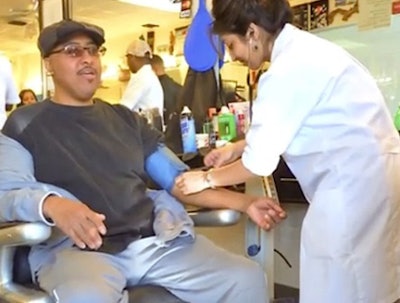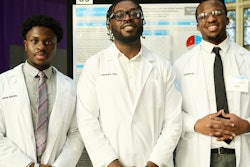 Among programs launched by the Maryland Center for Health Equity is the Health Advocates in Reach and Research (HAIR) initiative that brings health professionals to the community to serve people who are less likely to make the trip to a doctor’s office on their own. (photo by Stepehn Thomas)
Among programs launched by the Maryland Center for Health Equity is the Health Advocates in Reach and Research (HAIR) initiative that brings health professionals to the community to serve people who are less likely to make the trip to a doctor’s office on their own. (photo by Stepehn Thomas)The Maryland Center for Health Equity has launched an educational campaign aimed at bridging a longtime gap between health researchers and minority communities. The campaign, known as the “Building Trust Between Minorities and Researchers” program, represents the latest of many efforts the U.S. health care establishment has undertaken in recent years to reduce and eliminate disparities that saddle minorities with disproportionate health burdens and poor outcomes.
The rationale of “Building Trust Between Minorities and Researchers” largely seeks to overcome the history of neglect and abuse members of ethnic and racial minorities endured when few regulations governed medical research practices. Currently, few ethnic and racial minorities participate in clinical trials designed to investigate and discover treatments for diseases and other negative health conditions, according to center officials.
Clinical trials function as a fundamental step in research undertaken to bring about medical advances. The participation of individuals in clinical trials enables researchers to investigate new ways to prevent, detect or treat disease. Building Trust will encourage racial and ethnic minorities to participate in clinical trials, as well as encourage researchers to include minorities in research.
“As we have explored why African-Americans and other minorities are not involved in research, the literature makes very clear some of these barriers are that minorities don’t trust researchers,” said Dr. Stephen B. Thomas, director of the Maryland Center for Health Equity (M-CHE), which is based in the School of Public Health at the University of Maryland, College Park.
“And what you get underneath as to why don’t they trust these health professionals [there are] very disturbing stories that in many minority communities – African-American, Native American and Latino – have been passed down by word of mouth from the elders,” continued Thomas. “And that is the history of research abuse – the history of abusing our people in the name of science.”
Thomas noted that prominent examples of research abuse, such as what occurred in the Tuskegee Syphilis Study, still loom in the minds of Americans in part because of popular media and books.
“Everyone knows about Tuskegee. There’s been an HBO movie about it. Now we know about what happened to Henrietta Lacks because of the book by Rebecca Skloot and the HBO movie that’s coming out,” Thomas said.
Thomas explained that much of the campaign will center on online Building Trust curricula with one version designed for researchers and another aimed at community groups and individuals in minority communities. Also, within the Building Trust website, a treasure of interactive exercises, video clips, a searchable multimedia resource center and informative downloadable documents are available for use by individuals or groups.
“It’s our belief that if we’re going to improve the recruitment of racial and ethnic minorities into research then we need to do things that to help minorities understand research and know how to make a good informed decision about whether [clinical trial] participation is right for them,” said Dr. Sandra C. Quinn, the M-CHE senior associate director and a principal investigator in the Building Trust project.
Quinn said that despite Americans having access to the world’s best medical infrastructure and health care, far too many racial and ethnic minority Americans live with higher rates of illness and die younger than White Americans. The Building Trust project focuses on a critical front of the health disparities dilemma by addressing the underrepresentation of racial and ethnic minorities in biomedical and public health research.
In addition to offering the web-based curricula, M-CHE staff will conduct researcher training at academic research institutions and government agencies. Thomas noted that the project’s focus on health professionals addresses the fact that academic and other research institutions have either neglected or lagged in efforts to train researchers to be knowledgeable about and sensitive to minority communities.
“Be mindful that the vast majority of health professionals and researchers in this country are White,” Thomas said. “And so building trust between minorities and researchers will mean that we address both sides of the coin.”
While the M-CHE was established in 2010 with a primary commitment to improve the health of residents in the state of Maryland, Thomas said the thrust of the Building Trust campaign is national in scope.



















